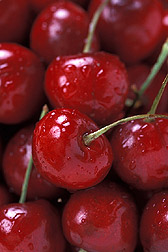This page has been archived and is being provided for reference purposes only. The page is no longer being updated, and therefore, links on the page may be invalid.
|
Cherries Pack an Anti-Inflammatory Punch
By Marcia WoodMay 11, 2006
If you love the taste and texture of sweet, juicy Bing cherries, now you have an even better reason to seek out the glossy, fun-to-eat fruit at your supermarket.
A study by Agricultural Research Service (ARS) chemist Darshan S. Kelley and colleagues confirms that Bing cherries may help fight the inflammation of arthritis, heart disease and cancer. Kelley is based at the agency's Western Human Nutrition Research Center in Davis, Calif.
For the research, 18 healthy men and women volunteers, aged 45 to 61, ate a total of about 45 fresh Bing cherries throughout the day for 28 consecutive days.
|
Blood samples indicated that levels of three telltale indicators of inflammation—nitric oxide, C reactive protein and a marker for T-cell activation, termed "RANTES"—dropped by 18 to 25 percent by the end of the cherry-eating stint.
Then, blood samples taken four weeks later indicated that volunteers' RANTES levels continued to decline. But their nitric oxide and C reactive protein levels began to increase.
Natural chemicals in cherries apparently work selectively, suppressing production of some of the body's inflammation-linked compounds, but not others, the researchers learned. For example, they found no significant decrease in levels of more than three dozen other markers of inflammation.
A smaller, shorter study of Bing cherries, conducted at the Davis nutrition center by Kelley and others and reported in 2003, also had shown a decrease in nitric oxide and C reactive protein levels. The followup investigation is apparently the longest yet conducted—with healthy volunteers who ate fresh cherries instead of extracts—to explore the anti-inflammatory effects of sweet cherries.
Kelley, retired ARS chemist Robert A. Jacob and ARS and University of California-Davis co-investigators published findings from the longer study in the April 2006 Journal of Nutrition. The grower-sponsored California Cherry Advisory Board of Lodi, Calif., helped fund the research.
ARS is the U.S. Department of Agriculture's chief scientific research agency.


